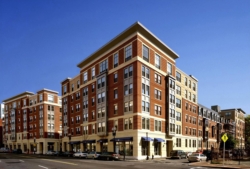Housing the poor: Planning Office marks 40 years of mission
BOSTON -- When Boston city planners in the 1960s and 1970s acted upon their vision of urban renewal -- razing lower-class neighborhoods to make way for businesses, in the hopes of revitalizing city life -- officials from the Archdiocese of Boston countered with a vision of their own. They launched a new office that would be charged with establishing permanent housing for lower and moderate income people.
Forty years later, the archdiocese’s Planning Office for Urban Affairs (POUA) is still advancing that mission of making quality housing available to those who might otherwise not able to afford it.
“Other social justice ministries do address the housing needs at the emergency housing or temporary housing shelter level,” said Lisa Alberghini, POUA president. “What we hadn’t covered, and what Cardinal (Richard) Cushing had the vision to see was that this was part of the Church’s mission, to provide permanent, affordable housing.”
To date, the POUA has created over 2,400 affordable housing units in eastern Massachusetts, according to Alberghini.
“During Advent, the Holy Family was homeless. They were looking for room in the inn,” said Cardinal Seán P. O’Malley at a Dec. 10 reception celebrating the office’s anniversary. “For the last 40 years, the Planning Office has been making room in the inn for 10,000 different people.”
The Planning Office was established in 1969 by Cardinal Cushing and Msgr. Michael Groden, its first director. Msgr. Groden served for 32 years before Alberghini took the helm. The office was formed when Boston was undergoing urban renewal, which included leveling urban neighborhoods, such as in the South and West Ends.
“Part of the urban planning belief of the day (was) that we need to get rid of these dense urban communities and make way for businesses. The reality was that it didn’t work out that way,” Alberghini said. “Msgr. Groden and Cardinal Cushing were supportive of a ‘new Boston,’ a vision to bring Boston into a new century and create more businesses. Then they realized that, at the same time that was happening, people were being thrown out of their homes.”
At first, Alberghini said, the office pioneered housing cooperatives, in which residents jointly own the property and in turn get to live in a single unit.
“That was an unusual thing we established in the state,” she said.
However, financing policies changed and prompted a switch in focus to family and mixed-income housing.
“Cooperative housing is more challenging to finance these days,” Alberghini said. “As the financing programs have evolved, we’ve evolved along with them.”
These developments house residents with a range of incomes, with roughly one-third being low income, another third classified as moderate income, and the remainder being residents who purchased units at market rate.
The profits from the market-rate units subsidize the cost of the low and moderate income affordable units.
Some of the office’s successes in family and mixed-income developments include Rollins Square, near the Cathedral of the Holy Cross in Boston’s South End and a community at the former St. Joseph Parish in Salem.
“That formula of one-third, one-third, one-third is what we would always like to be able to achieve because that’s an evenly economically diverse community,” Alberghini said. However, she noted that ratio is not always possible because of market conditions.
The office also has built affordable elderly housing units and units for those with HIV/AIDS. Elderly units include Rose Hill Manor in Billerica, St. Mary’s Apartments in Waltham, the D’Youville apartments in Lowell, and St. John of God in Brighton. St. John of God also serves those with HIV/AIDS and their families.
In this decade alone, the office has completed eight developments, with three more slated for completion by 2010.
“In recent years, despite a very challenging economy, they have completed a record number of housing units,” Cardinal O’Malley said. “We’re proud to know that the Church, through the office, is one of the most successful and productive affordable housing development organizations in the Commonwealth of Massachusetts.”
Although the focus changed from cooperatives to mixed-income housing over the years, the POUA’s focus on advocating for effective housing legislation and working on behalf of Chapter 40B legislation have not changed.
Chapter 40B is a state law that requires towns to do their “fair share in providing affordable housing for people in need,” according to Alberghini. It is on this front that the office has met the most opposition.
During its efforts to construct St. Aidan’s in Brookline, the office was sued by a neighbor opposed to these low-income rental units.
“In Brookline, the people of more modest means come into town in the morning, they wait on everybody else and serve them, and they have to leave at night because they cannot afford to live there,” Alberghini said. “The idea is, and the idea of the Church’s work in housing, was that people ought to be able live where they work and they should be able to live in all communities.”
“The Church was one of the main movers behind comprehensive permit law that says each community will do its own share of housing people in need,” she added.
Alberghini said the work is more than simply building homes.
“It’s an education kind of effort as much as anything,” Alberghini said. “Part of the ministry and the work is as much about having people understand who their neighbors are and welcome them as it is just building the bricks and mortar.”
Currently, the POUA is working with local non-profit agencies to allow residents of temporary shelters to transition into permanent homes, Alberghini said.
“If our office wasn’t here, there would be no capability of the Church to help provide for that next step housing,” Alberghini added. “What everyone really needs is a permanent home that they can afford, and then you can get on with your life.”



















